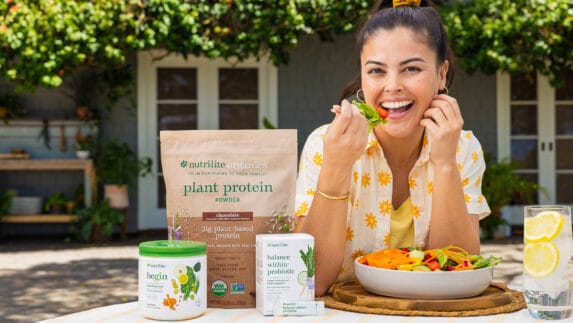The development
Perhaps you are eyeing a TikTok video or an ad in your social feed, tempted by the promise of a shortcut to longevity without committing to healthy lifestyle habits. Or maybe friends are abuzz about a single product that’s supposed to add years to your life.
Sound too good to be true? It should. Whatever the influencers say, science tells us there’s no shortcut to a long life.
But you can take action now – as early as age 25 and certainly beyond – to invest in your healthspan, the number of years you enjoy vigorous health and quality of life. That’s where Amway Research & Development has good news about the science of healthy aging, and we want to share the facts to help you sort them from fiction.
Why it is significant
Though in its infancy, the science of healthy aging is advancing rapidly. The research holds promise on several fronts that might help us enjoy robust health and greater vitality well into our later years. Imagine if we could maintain our intrinsic capacities – the abilities required for everyday living – throughout advanced age. Scientists around the world are working to unlock the regimens, nutrition, behaviors and perspectives that may help preserve those capacities and support quality of life, longer.
Here at Amway, we are finding exciting potential where healthy aging research intersects with what we know about plant compounds.
In fact, Amway scientists recently collaborated on a peer-reviewed article that discussed how certain promising plant compounds may help impact healthspan with their potential to support cellular, organ and functional systems. Published in the journal Frontiers and based on a review of the relevant scientific literature, the article contributes to a newer scientific perspective: how specific plants and their phytonutrients might help to support functional abilities in aging.
While it’s too early to predict future product development, the research does emphasize changes in perspective and steps you can take now to influence your healthspan. Here are five key takeaways.
1. View healthy aging as more than the absence of disease.
Researchers now advocate moving toward a positive model of aging which focuses on preserving functional abilities, rather than an emphasis on the absence of disease. This refers to the physical and mental abilities that enable you to perform daily activities effectively and maintain independence as you age. Focusing on the positive aspects of aging and quality of life helps you see the potential for wellbeing and functionality into later years. (1).
Science globally now views functional healthy aging as maintaining intrinsic capacity, or all of the physical, mental and social capabilities we use in daily life. These are:
- cognitive function (thinking, learning, memory, reasoning)
- sensory capacity (sight, hearing, taste, smell, touch)
- locomotor function (ability to get around)
- psychological wellbeing (emotional health)
- vitality (engagement in life)2
Your intrinsic capacity determines your ability to cope with aging and environmental challenges.
2. Prevention is more important than treatment.
The old saying “An ounce of prevention is worth a pound of cure” applies throughout your lifetime but focusing on prevention is especially critical to healthy aging. Lost capabilities such as mobility or eyesight are not likely to be restored, and lifestyle habits are the thing you can take control of today to influence the trajectory of your healthspan.
Scientists are researching interventions to maintain health over time to prevent age related declines in functional capacity. But these are future developments, and it is highly probable that lifestyle will still play a crucial part in retaining capacities. If you are in your 20s or 30s, committing now to long-term lifestyle changes may influence some of the foundational causes of the aging process, thereby slowing the decline process and improving your health as years pass. If you are in your 50s or later, lifestyle habits may help you maintain your capacities longer.
3. Diet and nutrition play key roles in your healthspan.
You’ve heard it before: lifestyle habits significantly affect your health trajectory. Diets high in sugar and saturated fats, and low in fruits and vegetables will catch up with you over time, as will lack of regular exercise and hydration every day.
Quality plant-based diets that provide essential nutrients and phytonutrients have the potential to impact multiple aging mechanisms, including inflammation, metabolism, and cellular repair. Several studies suggest that phytonutrients are an important daily dietary component for supporting healthy aging as they play a key role in maintaining normal metabolism and supporting overall quality of life.
4. Eat, drink and act now to slow the process or maintain your capacities.
You can’t choose your genes, which determine how your body may respond to stressors associated with accelerated aging, such as poor sleep, poor diet, pollution, smoking, drinking and excess UV exposure. But research shows you may maintain your capacities by controlling your behavior. Make these a habit:
- Exercise. Find routines that include cardio, strength-building, and support flexibility.
- Eat a balanced diet rich in plant foods that contain phytonutrients. The research strongly suggests that eating a variety of plants every day benefits overall health and healthy aging.
- Be a label-reader: select lean proteins and limit sugar, saturated fat, refined carbohydrates, and processed foods.
- Consider supplements to fill the gaps in your diet.
- Manage your stress. Look into mindfulness practices and other stress-busting activities.
- Get enough quality sleep.
- Protect your skin from excess sun exposure.
- Avoid smoking and limit alcohol.
5. Don’t fall for unsubstantiated claims.
A word of caution: there is a lot of information about health and aging out there, and not all of it is backed by sound science. Some companies are marketing supplements with promises of longevity and unqualified sources are sharing unsubstantiated claims. Some of them may even involve promising or trendy ingredients, but that doesn’t mean their benefits are proven with appropriate evidence in humans.
Amway Research & Development is committed to sharing facts that are grounded in science. If something doesn’t pass rigorous vetting by our experts, we won’t put it out there, and we ensure our claims are substantiated.
While quick, easy fixes may be tempting and influencers may seem persuasive, always ask yourself:
- How credible is this source?
- What expertise does the influencer have that makes this worth believing?
- What claims are they making about the product?
- What kind of evidence is presented to back the claims?
- Who else is talking about this, and what are they saying?
- Does what they are saying align with sources and information I know to be credible?
What happens next
We’re excited that the science indicates a connection between phytonutrients and healthy aging. We’re working to learn more, and we look forward to sharing new developments with you when we are confident in their substantiation. Sharing this information with others can help you support others in their own health and wellness journeys.
This article is based on Phytonutrients in the promotion of healthspan: a new perspective. Frontiers, July 12, 2024. Emma F. Jacquier, Amira Kassis, Diana Marcu, Nikhat Contractor**, Jina Hong**, Chun Hu**, Marissa Kuehn**, Christopher Lenderink** and Arun Rajgopal**. Accessed at https://www.frontiersin.org/journals/nutrition/articles/10.3389/fnut.2024.1409339/full
View more publications co-authored by Amway Research and Development Scientists at AmwayScience.com.
**Amway Research & Development
1 Bautmans, I, Knoop, V, Amuthavalli Thiyagarajan, J, Maier, AB, Beard, JR, Freiberger, E, et al. Who working definition of vitality capacity for healthy longevity monitoring. Lancet Healthy Longev. (2022) 3:e789–96. doi: 10.1016/s2666-7568(22)00200-8
2 Cesari M, Araujo de Carvalho I, Amuthavalli Thiyagarajan J, Cooper C, Martin FC, Reginster J-Y, et al. Evidence for the domains supporting the construct of intrinsic capacity. J Gerontol A. (2018) 73:1653–60. doi: 10.1093/gerona/gly011




